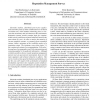Free Online Productivity Tools
i2Speak
i2Symbol
i2OCR
iTex2Img
iWeb2Print
iWeb2Shot
i2Type
iPdf2Split
iPdf2Merge
i2Bopomofo
i2Arabic
i2Style
i2Image
i2PDF
iLatex2Rtf
Sci2ools
120
click to vote
IEEEARES
2007
IEEE
2007
IEEE
Reputation Management Survey
Electronic markets, distributed peer-to-peer applications and other forms of online collaboration are all based on mutual trust, which enables transacting peers to overcome the uncertainty and risk inherent in the environment. Reputation systems provide essential input for computational trust as predictions on future behaviour based on the past actions of a peer. In order to analyze the maturity of current reputation systems, we compare eleven reputation systems within a taxonomy of the credibility aspects of a reputation system. The taxonomy covers three topics: 1) the creation and content of a recommendation, 2) the selection and use of recommenders, and 3) the interpretation and reasoning applied to the gathered information. Although we find it possible to form a trusted reputation management network over an open network environment, there are still many regulatory and technical obstacles to address. This survey reveals various good mechanisms and methods used, but the area still ...
Current Reputation Systems | IEEEARES 2007 | Reputation System | Reputation System Collaboration | Security Privacy |
Related Content
| Added | 03 Jun 2010 |
| Updated | 03 Jun 2010 |
| Type | Conference |
| Year | 2007 |
| Where | IEEEARES |
| Authors | Sini Ruohomaa, Lea Kutvonen, Eleni Koutrouli |
Comments (0)

